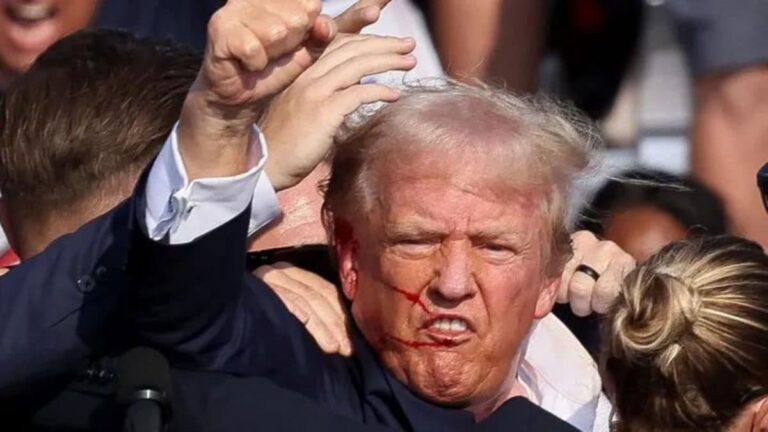Republican presidential candidate and former president Donald Trump is escorted away by security after shots rang out during a campaign rally at the Butler Farm Show in Butler, Pennsylvania, on July 13, 2024. Reuters
A shot fired at Donald Trump at a rally in Pennsylvania on Saturday is being investigated as an assassination attempt against the former president and current Republican presidential candidate.
American history is filled with assassination attempts on presidents and presidential candidates, and what happened in Pennsylvania is horrific but sadly not surprising.
I was really shocked by how many senior US officials said after the shooting that political violence has no place in the US. US President Joe Biden said this kind of violence is “unprecedented” in the US.
That’s really astonishing. The United States was founded on political violence and has characterized its entire history.
Indeed, Biden began his political career by positioning himself as the political successor to the slain Kennedy brothers, Presidents John F. Kennedy, who was assassinated in 1963, and Robert F. Kennedy, who was assassinated in 1968.
But given the volatile nature of the presidential campaign so far and the deep divisions in the United States, the timing of this incident is deeply worrying.
The rapid weaponization of mass shootings and the real-time development of conspiracy theories on social media means that this type of violence is highly likely to escalate.
The attack on the U.S. Capitol on January 6, 2021 shows how quickly political violence can erupt in the United States.
This is at least in part due to the deliberate cultivation of violent rhetoric by the far right in recent years, particularly since Trump first ran for president in 2016, when undercurrents of political violence have simmered at his rallies.
The threat of violence is central to Trump’s political image, his appeal and his base — one only needs to watch a few minutes of any of Trump’s rallies or speeches to hear him speak with great glee about violence, often in graphic detail.
For example, when speaking about the 2022 attack on former House Speaker Nancy Pelosi’s husband, Paul, at his home, Trump repeatedly referenced conspiracy theories, mocked Pelosi and joked about the attack.
This is a feature, not a flaw, of the Trump campaign and the movement that supports him.
And it has real-world implications: A nationwide investigation conducted by ABC News in 2020 found that President Trump himself had 54 criminal cases in which he was cited “directly related to acts of violence, threats of violence, or allegations of assault.”
Just a few weeks ago, Kevin Roberts, president of the right-wing think tank Heritage Foundation (architect of Project 2025, a plan to reform the US government under Trump), spoke of a “Second American Revolution” that “would remain bloodless if the left allowed it.”
Given how ever-present the threat of violence has become, it may be surprising that incidents on this scale do not happen more often, or that they have not happened yet.
Iconic image from the campaign
Trump is also striking as a master of political imagery, as seen in the video of the Pennsylvania shooting, in which he stands and then defiantly pumps his fist to have the image filmed.
Of course, that image will come to define this moment, if not Trump’s entire campaign.
The race has seen a series of turning points so far, but this one could be the defining one: turning Mr Trump from martyr to saint in the eyes of his supporters.
Watching how Trump, his campaign and those around him use this narrative will be crucial, especially ahead of the Republican National Convention, which is scheduled to begin in Wisconsin in just days.
Already there are elements on the right, particularly among Trump supporters, who are trying to use the assassination attempt as a rallying point for the former president to spread conspiracy theories.
Given the fallout from Biden’s debate performance in recent weeks, contrasting images of the two candidates are also emerging and could become further solidified, even if they are not accurately reflected.
The image of Trump with his bloodied fist raised will undoubtedly become the image of his entire campaign and help rally support.
So this could very well be the moment Trump wins the election.
Emma Shortis, Adjunct Senior Research Fellow, School of Global, Urban and Social Studies, RMIT University
This article is republished from The Conversation under a Creative Commons license. Read the original article.
Find us on YouTube
subscribe

